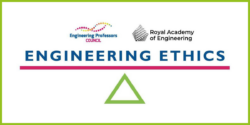 Welcome to the assessment pages of the EPC’s Engineering Ethics toolkit, produced in partnership with the Royal Academy of Engineering. Click here for the toolkit homepage.
Welcome to the assessment pages of the EPC’s Engineering Ethics toolkit, produced in partnership with the Royal Academy of Engineering. Click here for the toolkit homepage.
These assessment articles are intended to provide expert advice on how to assess ethics learning within engineering education.
- Methods for assessing and evaluating ethics learning in engineering education discusses the challenges of ethics assessment, alongside aims and methods, and tips for developing assessment tools.
- Assessing ethics: Guidance & rubric is designed in a way that encourages students to grapple with the numerous tensions involved in ethical decision making, with a focus on assessment of the decision-making process as opposed to the ‘answer’ given, the decision made, or the outcome of the scenario.
- Assessing ethics: Case study example: Water wars demonstrates how the questions provided in the rubric can be used to assess the competencies stipulated at each level, with this example focusing on our Water Wars case study.
To ensure that everyone can use and adapt these articles in a way that best fits their teaching or purpose, this work is licensed under a Creative Commons Attribution-ShareAlike 4.0 International License. Under this license you are free to share and adapt this material, under terms that you must give appropriate credit and attribution to the original material and indicate if any changes are made.
Get involved: These articles were created as part of the EPC’s Engineering Ethics Toolkit that is intended to evolve and grow over time. We are actively inviting experts to submit resources for review and possible inclusion in this toolkit. For more information, see our Get involved page.
 Welcome to the assessment pages of the EPC’s Engineering Ethics toolkit, produced in partnership with the Royal Academy of Engineering. Click
Welcome to the assessment pages of the EPC’s Engineering Ethics toolkit, produced in partnership with the Royal Academy of Engineering. Click